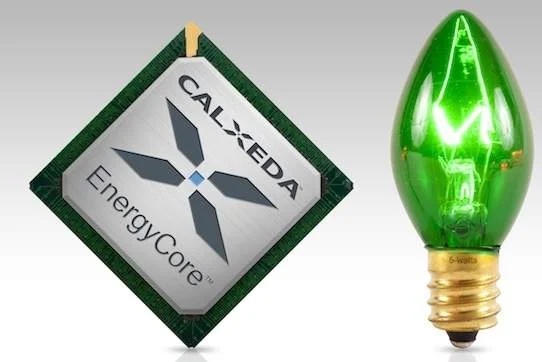Calxeda has introduced its ARM-powered “EnergyCore” Server-on-a-Chip (SoC).
The chip – which consumes as little as 1.5 watts – will be integrated into HP’s first generation of extreme low-energy server development platforms.

According to Calxeda CEO Barry Evans, the new SoC (a Cortex-A9 running between 1.1GHz-1.4GHz) consumes less than one tenth the power of today’s most energy efficient server processors.
“It is ideal for workloads such as web serving, ‘Big Data’ applications, scalable analytics [like] Apache Hadoop, media streaming and mid-tier infrastructure such as caching and in-memory scalable databases,” he explained.
“We believe a new era of energy-efficient servers is now dawning for scale-out workloads, and today we are introducing the foundational architecture that will enable this breakthrough.”
Indeed, the EnergyCore processor SoC boasts a supercomputing-class 80-Gigabit fabric switch, as well as an integrated management engine with power optimization software – all on a single piece of silicon.
The EnergyCore SoC also includes a full complement of server I/O features and a large 4MB ECC L2 cache, enabling system vendors to offer a complete server node that consumes only 5 watts, including 4GB of ECC memory and a large capacity SSD.
Clearly, the advent of ARM-powered servers, whether 32 or 64-bit, is likely to pose a serious challenge to Intel. Although Santa Clara may be preparing to counter ARM’s foray into the 64-bit server market with a new 8-core 22nm Atom, Silicon Valley tech guru Charlie Demerjian believes the rumored chip is probably too little too late – if it exists at all.
“It looks to all the world like a panicked reaction to ARM, a classic solution in search of a problem. It is far too late, more than a year after the first solid competition ships, and a year after the first ARMv8 chips are shown off. By the time Av/badon and it’s brethren ship, ARM will have either proven or disproven the market for this kind of server,” Demerjian opined in an article posted on SemiAccurate.
“Intel will have to do better than the sterling job it did convincing the phone market that Atom was worth paying more than ARM for a less compatible chip with questionable drivers. It may be a bit early to call this part of the server market game over for Intel, but, well, if anyone cares by late 2013, they won’t care about high margin x86 products in this segment. Too little, far far too late.”






